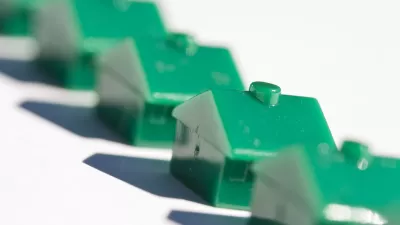For all the intention New York gets for foreign investors buying up rarefied air, Los Angeles has allowed shell companies to completely control the luxury real estate market—and the neighborhoods where it locates.
Louise Story reports on the sordid tale of the "most notorious new house" in Los Angeles, located in the tony neighborhood of Bel Air:
"Outraged neighbors call it 'the Starship Enterprise,' and in truth it looks like nothing so much as an earthbound space station of curved glass and steel, draped in scaffolding and tarpaulin, roughly 30,000 square feet and nearly 70 feet high."
That height, notes Story, is about twice the legal limit—but it's just one of a "litany" of violations. "Yet for all that," writes Story, "over four years of violation notices, inspections and hearings, efforts to hold someone accountable for the mess at 901 Strada Vecchia have repeatedly hit a legal wall. It is, as a judge said during an October session where once again nothing got done, 'an extremely complicated case.'"
The complexity of the case stems from the home's ownership by a shell company called 901 Strada L.L.C.—one of the hidden but powerful forces behind the changes at the top end of the real estate market. And the Los Angeles market has proven particularly attractive to such development practices:
"Shell companies were used in three-quarters of purchases of over $5 million in Los Angeles over the last three years, a higher rate even than the roughly 55 percent in New York, according to a New York Times analysis of data from PropertyShark. What is more, in Los Angeles, where so many of the new palaces are spec houses — luxury magnets for global wealth — not only are the buyers shielded by shell companies, but the developers are, too."
The comparison to New York is an important one—as that city has also faced considerable consternation over foreign wealth flooding the real estate market.
The long read article goes into a lot more detail about the Los Angeles market, why it works for shell companies in the luxury market, specific examples from the market, and some of the adverse impacts this kind of development has on surrounding neighborhoods.
FULL STORY: A Mansion, a Shell Company and Resentment in Bel Air

Maui's Vacation Rental Debate Turns Ugly
Verbal attacks, misinformation campaigns and fistfights plague a high-stakes debate to convert thousands of vacation rentals into long-term housing.

Planetizen Federal Action Tracker
A weekly monitor of how Trump’s orders and actions are impacting planners and planning in America.

In Urban Planning, AI Prompting Could be the New Design Thinking
Creativity has long been key to great urban design. What if we see AI as our new creative partner?

King County Supportive Housing Program Offers Hope for Unhoused Residents
The county is taking a ‘Housing First’ approach that prioritizes getting people into housing, then offering wraparound supportive services.

Researchers Use AI to Get Clearer Picture of US Housing
Analysts are using artificial intelligence to supercharge their research by allowing them to comb through data faster. Though these AI tools can be error prone, they save time and housing researchers are optimistic about the future.

Making Shared Micromobility More Inclusive
Cities and shared mobility system operators can do more to include people with disabilities in planning and operations, per a new report.
Urban Design for Planners 1: Software Tools
This six-course series explores essential urban design concepts using open source software and equips planners with the tools they need to participate fully in the urban design process.
Planning for Universal Design
Learn the tools for implementing Universal Design in planning regulations.
planning NEXT
Appalachian Highlands Housing Partners
Mpact (founded as Rail~Volution)
City of Camden Redevelopment Agency
City of Astoria
City of Portland
City of Laramie





























